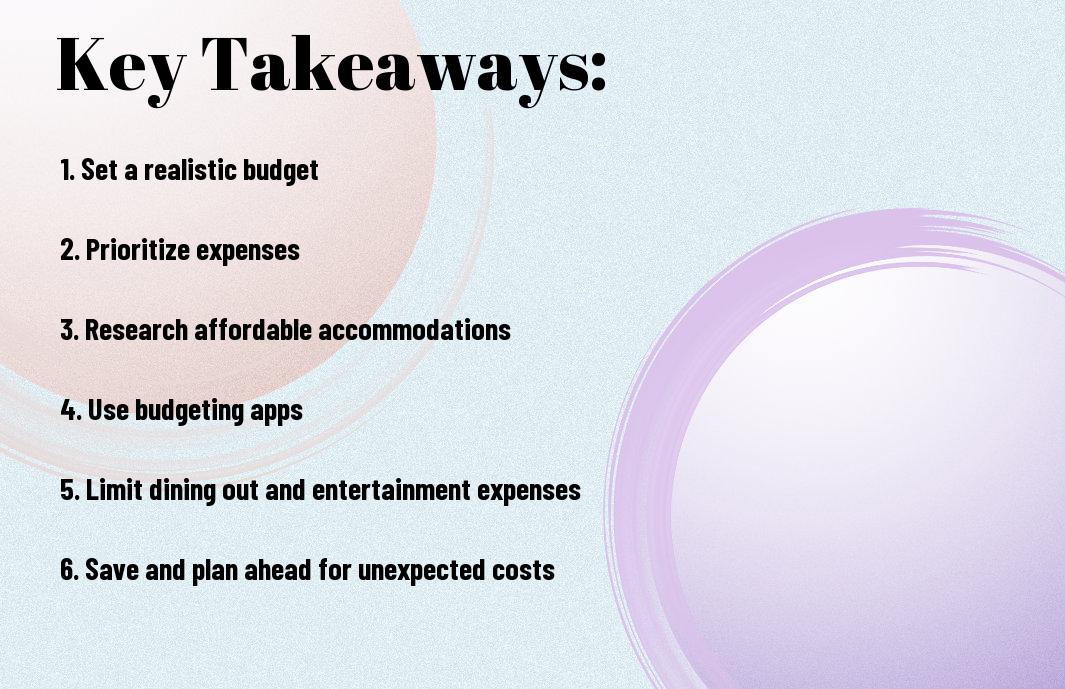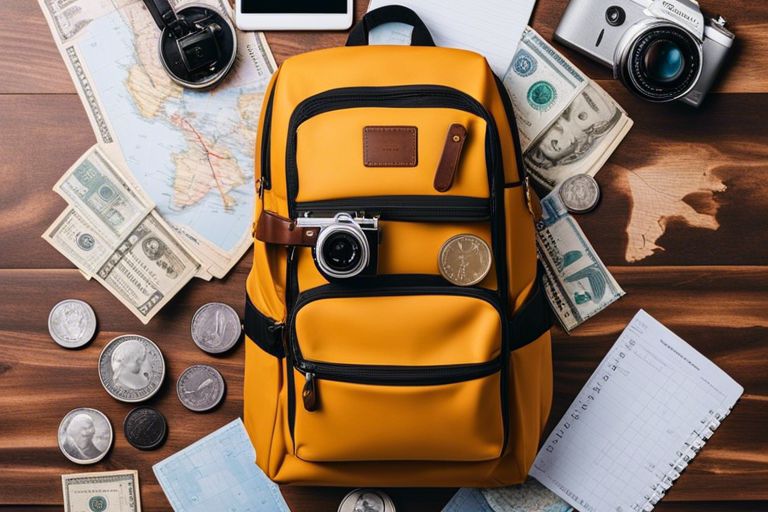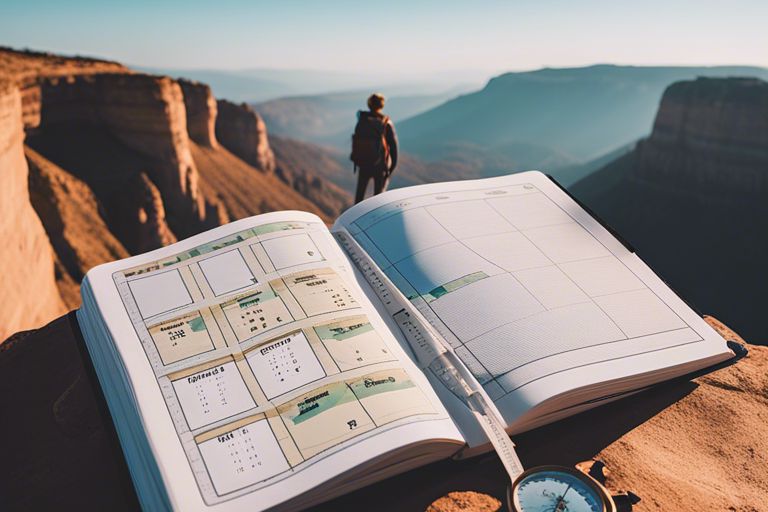Table of Contents
Embarking on a long-term trip is an exciting and rewarding experience, but it requires careful planning and budgeting to ensure it goes smoothly. Without a solid financial plan in place, you could find yourself running out of money far from home. In this blog post, you will learn the best strategies for budgeting for a long-term trip, including how to save money, manage expenses, and avoid common pitfalls that can derail your travel plans. By the end, you’ll feel confident in your ability to manage your finances and make the most of your long-term adventure.
Key Takeaways:
- Plan ahead: Creating a detailed itinerary and estimating costs for each aspect of your trip is crucial for budgeting for a long-term travel adventure.
- Save consistently: Setting aside a portion of your income consistently leading up to your trip will build up a substantial travel fund over time.
- Research cost-effective options: Take the time to research budget-friendly accommodation, transportation, and activities to stretch your travel budget further.
- Use budgeting tools: Utilize online budgeting tools and apps to track and manage your travel expenses effectively while on the go.
- Be flexible with your plans: Being open to changes and adjustments during your trip can help you stay within budget and make the most of your long-term travel experience.


Pre-Trip Financial Preparation
If you are planning a long-term trip, it is crucial to make sure you are financially prepared before embarking on your adventure. The last thing you want is to run out of money halfway through your trip and have to cut it short. Pre-trip financial preparation involves assessing your current financial situation, setting realistic trip goals and budget limits, and implementing saving strategies to build your travel fund.
Assessing Your Current Financial Situation
Before planning for your long-term trip, it is important to take a close look at your current financial situation. Evaluate your income, expenses, debts, and existing savings. This will give you a clear picture of where you stand financially and help you determine how much you need to save for your trip. Understanding your current financial situation will also allow you to make necessary adjustments to your budget to accommodate your travel goals.
Setting Realistic Trip Goals and Budget Limits
When budgeting for a long-term trip, it’s essential to set realistic goals and budget limits. Determine the duration of your trip, the destinations you want to visit, and the activities you want to engage in during your travels. Once you have a clear idea of your trip itinerary, you can estimate the total cost and set a realistic budget limit. It’s important to be **realistic** about what you can afford, considering all potential expenses such as accommodation, transportation, food, entertainment, and unexpected costs.
Saving Strategies for Your Travel Fund
Building a travel fund for your long-term trip requires **discipline** and **dedication**. Consider implementing saving strategies such as setting up automatic transfers to a dedicated travel savings account, cutting unnecessary expenses, taking on a side job or freelance work, and selling items you no longer need. **Consistent saving** and **financial discipline** will help you reach your travel fund goal faster. It’s important to stay focused on your long-term travel goal and make **financial decisions** that align with your priorities.

Creating a Long-Term Travel Budget
However, before embarking on a long-term trip, it’s crucial to create a comprehensive and realistic budget that takes into account all potential expenses. By carefully planning and allocating your funds, you can avoid financial stress and fully enjoy your travel experience.
Estimating Daily and Monthly Travel Expenses
When creating your long-term travel budget, it’s essential to estimate your daily and monthly expenses. This includes costs such as accommodation, food, transportation, activities, and incidentals. Research the cost of living in your chosen destination and use online resources and travel guides to help you estimate your expenses. Be sure to allocate a generous amount for daily expenses to account for unexpected costs and activities.
Accounting for Transportation and Accommodation Costs
Transportation and accommodation are typically the largest expenses when traveling long-term. Consider factors such as the cost of flights or long-distance travel, as well as the average nightly cost of accommodation. You may also want to research alternative options such as hostels, Airbnbs, or house-sitting opportunities to minimize these costs. Additionally, consider the cost of local transportation and any long-term travel passes that could provide savings.
Hidden Costs and Unexpected Expenses to Consider
When budgeting for a long-term trip, it’s important to account for hidden costs and unexpected expenses. This could include travel insurance, visa fees, medical expenses, and even potential emergency situations. Make sure to set aside a buffer for these unforeseen expenses to avoid financial strain. Additionally, be aware of potential scams or tourist traps that could lead to unnecessary spending. By anticipating these hidden costs, you can better prepare for any unexpected financial challenges during your trip.
Money Management While Traveling
Despite the excitement of traveling, it’s crucial to keep track of your finances to ensure a smooth and stress-free trip. Managing your money while on the road is an essential part of long-term travel planning. You can learn more about budgeting for long-term travel in this helpful resource: How to Create a Long-Term Travel Budget.
Tracking Your Spending on the Go
One way to manage your money while traveling is to track your spending on the go. Keeping a detailed record of your expenses can help you stay within your budget and identify any areas where you might be overspending. Consider using a travel expense tracker app or keeping a travel journal to record your daily expenses. This will help you stay organized and in control of your finances while on the road.
Using Budgeting Tools and Apps for Travelers
There are plenty of budgeting tools and apps designed specifically for travelers. These apps can help you track your spending, create a budget, and even find ways to save money while on the road. Look for apps that offer currency conversion, expense categorization, and real-time tracking of your finances. By utilizing these tools, you can effectively manage your money and stay on budget during your long-term trip.
Tips for Economical Living and Stretching Your Budget
When traveling long-term, it’s important to practice economical living and find ways to stretch your budget. Here are some tips to help you make the most of your travel funds:
- Stay in budget accommodations: Look for affordable lodging options such as hostels, guesthouses, or vacation rentals.
- Cook your own meals: Eating out can quickly drain your budget, so consider cooking your own meals or having a picnic in local parks.
- Use public transportation: Instead of relying on taxis or rental cars, use public transportation to get around and save money on transportation costs.
Any time you can cut costs on the road, you’ll have more money to spend on memorable experiences and activities.
Adjusting Your Budget Mid-Trip
After setting a budget for your long-term trip, it’s important to understand that unexpected expenses or changes in plans can occur. It’s essential to be flexible and know how to adjust your budget accordingly to ensure you can continue traveling without any financial strain.
Identifying and Cutting Unnecessary Expenses
When you find yourself in a situation where your expenses are exceeding your budget, the first step is to identify and cut any unnecessary expenses. Take a close look at your spending habits and determine where you can make cuts. This might mean skipping expensive tourist attractions, dining at local eateries instead of fancy restaurants, or opting for budget accommodation options.
Generating Income or Volunteering While Traveling
If you’re facing a budget shortfall during your long-term trip, consider generating income or volunteering to offset your expenses. You could take up temporary work such as freelance writing, teaching English, or working in a hostel. Another option is volunteering in exchange for accommodation and meals, which can help reduce your daily expenses significantly.
Conclusion
Ultimately, when budgeting for a long-term trip, it is important to carefully consider your expenses, prioritize your spending, and research ways to save money. By creating a detailed budget that includes all anticipated costs, setting aside an emergency fund, and making strategic decisions when it comes to accommodations, transportation, and activities, you can ensure that you have a realistic and sustainable financial plan for your trip. Additionally, utilizing travel rewards programs and seeking out budget-friendly options can help you make the most of your money while still experiencing all that your destination has to offer. By taking these steps, you can feel confident in your ability to manage your finances and enjoy your long-term travel adventure to the fullest.
FAQ
Q: What are the best ways to budget for a long-term trip?
A: Budgeting for a long-term trip requires careful planning and consideration. Here are the best ways to budget for your trip:
1. Research and estimate your expenses – Determine the cost of accommodations, transportation, food, activities, and other anticipated expenses for your trip.
2. Create a detailed budget – Once you have an estimate of your expenses, create a budget that allocates funds for each category. Be sure to include a buffer for unexpected expenses.
3. Use budgeting tools and apps – Take advantage of budgeting tools and apps to help you track your spending, set savings goals, and stay within your budget.
4. Save and set aside funds – Start saving money well in advance of your trip and set aside a separate fund specifically for your travel expenses. Consider opening a separate bank account for your travel savings to keep it separate from your regular funds.
5. Be mindful of your spending – While on your trip, be mindful of your spending and try to stick to your budget as much as possible. Consider using cash to limit your spending and avoid unnecessary expenses.
6. Be prepared to adjust your budget – Be flexible with your budget and be prepared to adjust it as needed based on changes in expenses or unexpected costs.
Q: How can I save money for a long-term trip?
A: Saving money for a long-term trip requires discipline and dedication. Here are some effective ways to save money for your trip:
1. Establish a savings goal – Determine how much money you need to save for your trip and set a realistic savings goal. Having a specific target in mind can help you stay motivated and focused on saving.
2. Cut unnecessary expenses – Identify and cut out unnecessary expenses from your daily life, such as dining out, subscription services, and impulse purchases. Redirect the money you save into your travel fund.
3. Open a dedicated travel savings account – Consider opening a separate savings account specifically for your travel fund. This can help you keep track of your progress and prevent you from dipping into the funds for other purposes.
4. Pick up a side hustle – Explore opportunities to earn extra income through freelance work, part-time jobs, or selling unwanted items. Allocate the additional earnings directly towards your travel savings.
5. Use discounts and rewards – Take advantage of discounts, rewards programs, and cashback offers to save on everyday purchases. Sign up for travel credit cards that offer sign-up bonuses and rewards for spending.
6. Automate your savings – Set up automatic transfers from your checking account to your travel savings account to consistently contribute to your travel fund. This will help you save without having to think about it.
Q: What are some tips for managing expenses during a long-term trip?
A: Managing expenses during a long-term trip is crucial for staying within your budget. Here are some tips for effectively managing your expenses:
1. Prioritize your spending – Identify the essential expenses, such as accommodation, transportation, and food, and prioritize those over non-essential items and activities.
2. Research free and low-cost activities – Look for free or budget-friendly attractions, tours, and events at your destination. Take advantage of public parks, museums with free admission days, and walking tours to explore the area without breaking the bank.
3. Cook your own meals – Avoid dining out for every meal by shopping at local grocery stores and preparing your own meals. Opt for accommodations with kitchen facilities to have the option to cook and save money on dining expenses.
4. Use public transportation – Utilize public transportation, bike rentals, or walking as much as possible to save on transportation costs. Research transportation passes and options for long-term visitors to get the best deals.
5. Monitor your spending – Keep track of your expenses and review your budget regularly to ensure you are staying on track. Use budgeting apps or spreadsheets to monitor and categorize your spending.
6. Be mindful of exchange rates and transaction fees – When traveling internationally, be aware of exchange rates and transaction fees for currency conversions and ATM withdrawals. Consider using a travel-friendly credit card with no foreign transaction fees to save on currency charges.

